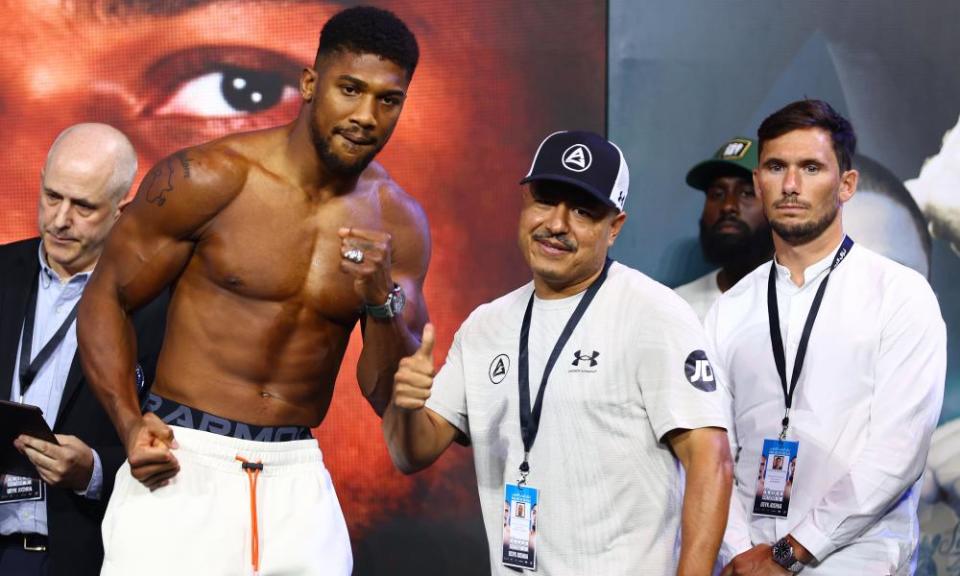Anthony Joshua urged to speak out on human rights abuses in Saudi Arabia

Anthony Joshua has insisted he does not condone human rights abuses in Saudi Arabia after being urged to speak out by a pro-democracy activist whose brother was among 81 people executed by the state in March.
The Guardian can reveal that Joshua was recently sent a letter by Yasser al-Khayat, whose brother Mustafa was killed in the largest mass execution in Saudi Arabia’s history, asking him to follow the lead of Muhammad Ali and Lewis Hamilton by standing up for freedom and human rights in the buildup to his world title fight which takes place in Jeddah on Saturday.
Related: Oleksandr Usyk lighter than expected before rematch with Anthony Joshua
“My brother was executed by the Saudi Arabian authorities for daring to ask for basic human rights that you enjoy in the UK,” the letter tells Joshua. “He was one of the 81 men killed in the largest mass execution in the country’s history. Over half of them, including Mustafa, were executed for taking part in pro-democracy protests.
“Saudi Arabia executed him in secret and we weren’t given any notice. We didn’t have a chance to say goodbye and his body hasn’t even been returned to our family for a proper burial. Our community is in mourning and our people are living in fear.”
The issue of human rights in the kingdom was highlighted again last week when Salma al-Shehab, a Leeds University PhD student, was given a 34-year prison sentence for posting her support of women’s rights activists on Twitter. The sentence was condemned as “outrageous” by Amnesty International.
In his letter Khayat reminds Joshua that speaking out can make a real difference. “Lewis Hamilton shows that sports figures can go to Saudi Arabia to compete and also express solidarity with its people,” the letter says.
“The Saudi Arabian authorities use events like your boxing match to distract from its oppression. If the fight takes place without human rights being raised, it sends the message to Saudi Arabia’s rulers that they can kill without consequences.
“When Muhammad Ali fought George Foreman in Zaire in 1974 – the ‘Rumble In The Jungle’ – he showed his solidarity with the country’s people, and became their champion. You can be the champion of Saudi Arabia’s people, by acknowledging their suffering and calling for their rights to be respected by the regime.”
A spokesman for Joshua pledged to investigate Al-Khayat’s case. “Anthony takes his responsibility as a global sports figure very seriously and does not condone any form of human rights abuse,” he told the Guardian. “He and his management are grateful for being made aware of this particular situation and will take steps to look into this further post his fight on Saturday night”.
The non-governmental organisation Reprieve, which helps people in Saudi Arabia facing the death penalty for childhood crimes, non-violent offences or on charges related to their participation in pro-democracy protests, also offered to meet Joshua when he returns to the UK. “International pressure on Saudi Arabia can make a difference,” it said, pointing to a royal decree in 2020 purportedly abolishing the death penalty for juveniles.
Jeed Basyouni, head of Reprieve’s work in the Middle East and North Africa, added: “Mohammed bin Salman is trying to use major sporting events like this to sportswash his blood-soaked regime. Anthony Joshua can change that by using his visit to speak out about human rights to help save lives”.
The Guardian has approached Saudi authorities for comment.

 Yahoo Movies
Yahoo Movies 